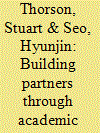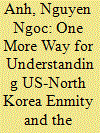| Srl | Item |
| 1 |
ID:
128746


|
|
|
|
|
| Publication |
2014.
|
| Summary/Abstract |
Science can serve as an attractive mode for trust building and cooperative engagement between countries where formal political or diplomatic relations have been strained or are nonexistent. In this article we discuss some conditions and constraints for bilateral academic science engagement and suggest how such engagement might help to build trust between the United States and North Korea. We analyze longitudinal data on North Korea's diplomatic ties and international academic collaboration as well as US public opinion data to provide context for US-North Korea science engagement. We argue that bilateral academic science engagement should be attractive to the United States and North Korea and suggest a set of policy measures that might facilitate such engagement.
|
|
|
|
|
|
|
|
|
|
|
|
|
|
|
|
| 2 |
ID:
184709


|
|
|
|
|
| Summary/Abstract |
This study examines the fundamental causes of intractable conflict and deadlocked negotiation by centering on identity. The cognitive variables of identity are derived, and the causal layered analysis framework is used to analyze the influencing mechanism among cognitive layers. This research assumes that conflicts are influenced by interactions among key variables of the identity frame in the cognitive layer: “ingroup definition,” “outgroup definition,” and “conflict narrative.” The United States–North Korea denuclearization negotiation case is examined using this framework, seeking to understand how these factors influenced the conflict, policy initiatives and negotiations.
|
|
|
|
|
|
|
|
|
|
|
|
|
|
|
|
| 3 |
ID:
187423


|
|
|
|
|
| Summary/Abstract |
In this essay, we attempt to use Alexander Wendt’s Hobbesian culture hypothesis to examine three aspects of US-North Korea relationship: (i) what kind of relationship it has belonged to, (ii) why it has not changed for over past 70 years, and (iii) what possible relationship between the USA and North Korea will be under the Biden Administration. The results show that Hobbesian culture has been dominating US-North Korea relations since 1949 when the USA did not recognize North Korea’s sovereignty and then launched unlimited war against North Korea in late 1950. Then the difference in internalization of the USA and North Korea to Hobbesian culture generated two opposing goals: while the USA pursues interests created by the existence of Hobbesian culture, North Korea pursues interests generated by the end of this Hobbesian culture. This is the main factor that has prevented a structural change over past 70 years. Theoretically, there may be at least three possibilities to change the structure of US-North Korea relations under the Biden Administration. But our examination of these possibilities show that it is hard for these possibilities to come true. It is suggested in this essay that the USA should try to improve its relations with North Korea by increasing US-North Korea interdependence. Once the interdependence is generated, the external restraint will be created. And when great enough, the interdependence will improve their relation and even create a structural change in the further future.
|
|
|
|
|
|
|
|
|
|
|
|
|
|
|
|